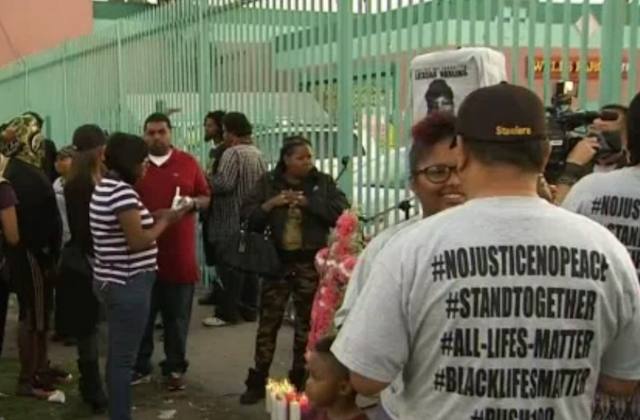Family, Community Commemorate 25th Anniversary of Latasha Harlins' Death

Simmering tension between Los Angeles' African- and Korean-American communities reached a fever pitch on March 16, 1991, when Korean shop owner Soon Ja Du shot 15-year-old Latasha Harlins in the back of the head after an escalating physical confrontation over suspected robbery. Yesterday (March 16), 25 years after Harlins' death, her family and community members honored her with a candlelight vigil in South Central Los Angeles.
"She represents so many that are not here that would have been something to somebody," Latasha's aunt Denise Harlins said at the vigil, according to the Los Angeles Times. Denise co-founded the Latasha Harlins Justice Committee, which sought justice for her niece in the aftermath of her death.
The Times reports that Latasha put a bottle of orange juice in her knapsack before going to Du's store counter. Du accused her of trying to shoplift, which was countered by witnesses who said Harlins showed two dollar bills with the intent of paying. The Los Angeles Police department eventually ruled that Harlins wasn't trying to steal. Du then grabbed Harlins' shirt, prompting a struggle during which Harlins knocked Du to the ground. After Harlins left the orange juice behind and walked to the door, Du shot her at close range. The shooting, caught on grainy store surveillance video, happened a mere two weeks after footage of LAPD officers beating Rodney King surfaced.
A jury found Du guilty of manslaughter, with a maximum sentence of 16 years. But Judge Joyce Karlin sentenced her to five years probation, community service and a fine. The inflamed tensions reemerged a year later during the 1992 riots, when many people targeted Korean-owned shops and members of the local Korean-American community took up arms to defend their properties.
Harlins' death remains relevant today as Asian-American communities, like they did in the '90s, reckon with anti-Blackness and the decision to fight for collective justice in the aftermath of incidents like Akai Gurley's shooting death at the hands of NYPD Officer Peter Liang.
(H/t Los Angeles Times, NBC4)
